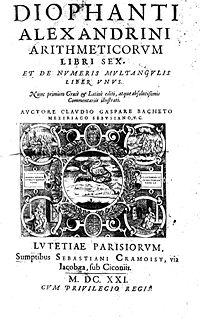
Claude Gaspard Bachet de Méziriac
Encyclopedia

French people
The French are a nation that share a common French culture and speak the French language as a mother tongue. Historically, the French population are descended from peoples of Celtic, Latin and Germanic origin, and are today a mixture of several ethnic groups...
mathematician
Mathematician
A mathematician is a person whose primary area of study is the field of mathematics. Mathematicians are concerned with quantity, structure, space, and change....
, linguist, poet and classics scholar born in Bourg-en-Bresse
Bourg-en-Bresse
Bourg-en-Bresse is a commune in eastern France, capital of the Ain department, and was capital of the former province of Bresse . It is located north-northeast of Lyon.The inhabitants of Bourg-en-Bresse are known as Burgiens.-Geography:...
.
Bachet was a pupil of the Jesuit mathematician Jacques de Billy
Jacques de Billy
Jacques de Billy was a French Jesuit mathematician. Born in Compiègne, he subsequently entered the Society of Jesus. From 1629 to 1630, Billy taught mathematics at the Jesuit College at Pontà Mousson. He was still studying theology at this time. From 1631 to 1633, Billy taught mathematics at...
at the Jesuit College in Rheims. They became close friends.
Bachet wrote the Problèmes plaisants, of which the first edition was issued in 1612, a second and enlarged edition was brought out in 1624; this contains an interesting collection of arithmetical tricks and questions, many of which are quoted in W. W. Rouse Ball
W. W. Rouse Ball
-External links:*...
's Mathematical Recreations and Essays. He also wrote Les éléments arithmétiques, which exists in manuscript; and a translation, from Greek to Latin, of the Arithmetic of Diophantus
Diophantus
Diophantus of Alexandria , sometimes called "the father of algebra", was an Alexandrian Greek mathematician and the author of a series of books called Arithmetica. These texts deal with solving algebraic equations, many of which are now lost...
(1621). It was this very translation in which Fermat wrote his famous margin note claiming that he had a proof of Fermat's last theorem
Fermat's Last Theorem
In number theory, Fermat's Last Theorem states that no three positive integers a, b, and c can satisfy the equation an + bn = cn for any integer value of n greater than two....
.
Bachet was the earliest writer who discussed the solution of indeterminate equations by means of continued fraction
Continued fraction
In mathematics, a continued fraction is an expression obtained through an iterative process of representing a number as the sum of its integer part and the reciprocal of another number, then writing this other number as the sum of its integer part and another reciprocal, and so on...
s. He also did work in number theory
Number theory
Number theory is a branch of pure mathematics devoted primarily to the study of the integers. Number theorists study prime numbers as well...
and found a method of constructing magic square
Magic square
In recreational mathematics, a magic square of order n is an arrangement of n2 numbers, usually distinct integers, in a square, such that the n numbers in all rows, all columns, and both diagonals sum to the same constant. A normal magic square contains the integers from 1 to n2...
s. Some credible sources also name him the founder of the Bézout's identity
Bézout's identity
In number theory, Bézout's identity for two integers a, b is an expressionwhere x and y are integers , such that d is a common divisor of a and b. Bézout's lemma states that such coefficients exist for every pair of nonzero integers...
.
For a year in 1601 Bachet was a member of the Jesuit Order. He lived a comfortable life in Bourg-en-Bresse and married in 1612. He was elected member of the French Academy
Académie française
L'Académie française , also called the French Academy, is the pre-eminent French learned body on matters pertaining to the French language. The Académie was officially established in 1635 by Cardinal Richelieu, the chief minister to King Louis XIII. Suppressed in 1793 during the French Revolution,...
in 1635.

